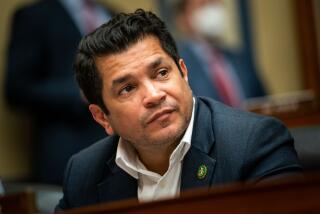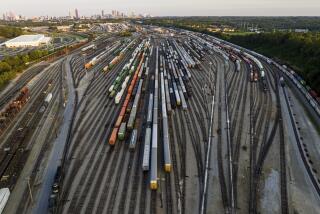Soviet Strikers Warned Against Rail Shutdown : Gorbachev Says Wider Action Is ‘the Wrong Way,’ Hints of New Measures to Control Unrest
- Share via
MOSCOW — Soviet President Mikhail S. Gorbachev warned Wednesday that a threatened spillover of coal strikes to the railroads could have “very far-reaching economic, social and political consequences” and could force the Kremlin to consider new ways “to prevent the situation from getting out of hand.”
Gorbachev’s unscheduled remarks before the Soviet Parliament constituted the most ominous official reaction since labor unrest erupted 10 days ago in the Kuznets Basin of Siberia. They were interpreted here as a signal of growing government alarm over what at first were depicted as justifiable protests.
Referring twice to previously unreported calls for railway workers to join the coal strike Aug. 1, Gorbachev said: “We must declare this with full responsibility before the entire people, we must tell them, ‘This is not the road! This is the wrong way!’ ”
Railways Are Vital
Given the Soviet Union’s vast distances and underdeveloped highway system, railroads are an extraordinarily vital economic link. They carry about 80% of the country’s freight and the greater part of its inter-city travelers. A widespread rail strike could quickly cripple the country.
“It seems to me that we must keep a cool head but not rest complacent or inactive” in the face of the rail threat, Gorbachev said.
Meanwhile, government efforts to appease the striking coal miners apparently were having mixed results.
Soviet television reported Wednesday night that about 24,000 Siberian miners had gone back to work after being urged by strike committee leaders to accept pledges of higher pay, improved food supplies and more financial autonomy at their mines. However, it said, 150,000 others remained on strike.
Nikolai A. Artinov, a dispatcher at a Kemerovo coal combine that earlier in the day was idle, said in a telephone interview that four mines resumed operations with the midnight shift and that workers at nine others were scheduled to be back on the job by 9 a.m. today.
Meanwhile, a related strike in the Donets Basin of the Ukraine apparently was growing. This strike, which began over the weekend at eight mines, had by Wednesday closed 70 of the region’s 120 mines, according to the main evening television news.
A special high-level government commission has been negotiating with the Siberian miners, and Gorbachev disclosed Wednesday that he had sent a telegram the night before promising the Donets miners equal treatment. However, the Soviet leader acknowledged that “I understand from the information I got this morning that there are still differences.”
The somber tone of Gorbachev’s remarks contrasted sharply with the authorities’ initial reaction to the Siberian strikes. Nikolai N. Slyunkov, a member of the Communist Party’s ruling Politburo, who was sent to the Kuznets Basin to deal with the situation, quickly capitulated to several of the strikers’ demands and even praised the miners for their “high civic consciousness.”
Pressure From Below
The strikers were seen as having responded to Gorbachev’s call for pressure from below to implement his program of reforms known as perestroika . The miners’ call for greater local autonomy appeared to mesh with Gorbachev’s efforts to decentralize the system--efforts that he says are being frustrated by a stubborn layer of party and government bureaucrats.
At first the reformers may have quietly welcomed the strikes, but a Western analyst said Wednesday that “I think in the last 36 hours, they have become somewhat more alarmed as this has spread” from Siberia to the European part of the country.
Widespread media coverage of the miners’ demands and of official concessions could encourage a spread of strike fever.
“Clearly, workers all over have the same grievances as these guys--shortages of food, poor housing, a rising cost of living, unresponsive local officials,” the Western analyst said. “Those grievances are almost universal here.”
Some of the miners’ complaints can be dealt with quickly, but there appears to be no easy solution for the others. Gorbachev said it will take at least a month to study all their grievances.
Most Polluted Cities
For example, the Moscow News reported that Kemerovo and Novokuznetsk are among the 10 most polluted cities in the world. Life expectancy in the Siberian coal region, it said, is 10 years below the national average.
The mining town of Yenakiyevo in the Ukraine has running water only two hours a day, Soviet television said. Such problems are not likely to be solved soon.
The workers, meanwhile, have been far less compliant than in some past labor actions. Local officials in Prokopyevsk, one of the centers of the Kuznets Basin unrest, quickly arranged for supplies of instant coffee, candy and fashionable clothing to go on sale on the second day of the strike. But according to the Moscow News, the local strike committee immediately stopped the sales, saying, “We don’t want handouts.”
Officials here are also concerned about the coal strikes being used for purely political ends.
“There are already people in Kemerovo who are urging miners to put an end to communism and socialism,” Gorbachev told members of Parliament. “Emissaries appeared who want to see if it’s possible to merge their extremist, anti-socialist slogans with those raised by the workers, and to cash in on the workers’ dissatisfaction.”
Gorbachev said that while workers’ concerns should be heard, “even in the sharpest form, one should realize that the pressing problems can be solved only along the road of perestroika .”
Gorbachev, while focusing more on the danger of the strikes getting out of control, also repeated his criticism of local party and government officials who are undermining his reforms in the mining regions and elsewhere.
On Tuesday, he had singled out the official trade union organization for criticism, and there was some speculation here that it may be headed for a shake-up.
“Gorbachev in the past has used these crises to his own advantage and to advance the long-term reform goals that he has promoted,” the Western analyst said. “He may be getting ready to point the finger at the trade union movement, which has been lukewarm about perestroika from the beginning.”
The trade unions are headed by Stepan A. Shalaev, 60, one of the few remaining holdovers from the era of the late and now-discredited Soviet leader Leonid I. Brezhnev.
RARE LABOR UNREST
The labor strike is not a new phenomenon in the Soviet Union, but for a long time it has been a rarity.
Trade unions were organized after the revolution of 1905, and strikes were commonplace for much of the next two decades. The Bolsheviks, who established the Soviet Union after the revolution of 1917, virtually outlawed strikes.
Under the Soviet system, trade unions were transformed into an instrument of the Communist Party. Their role has been to enforce worker discipline, administer welfare plans and work for the achievement of the government’s economic goals.
There have been unpublicized strikes off and on during the postwar period. One of the most serious was in 1962 at Novocherkassk in southern Russia, when troops shot scores of workers to death while putting down protests against food price increases. In 1988, there were widespread strikes in the autonomous region of Nagorno-Karabakh, spurred by ethnic conflict between Armenians and Azerbaijanis.
The strikes now sweeping Soviet coal mines are regarded as particularly significant because they were triggered for the most part by social welfare issues.
More to Read
Sign up for Essential California
The most important California stories and recommendations in your inbox every morning.
You may occasionally receive promotional content from the Los Angeles Times.













